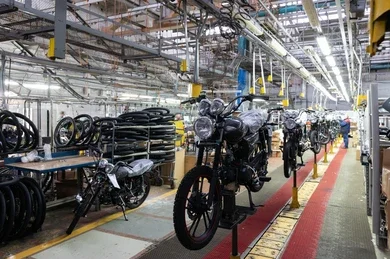In recent years, the motorcycle industry has witnessed a remarkable transformation with the rise of electric power. As concerns over climate change and the need for sustainable transportation solutions grow, electric motorcycles have emerged as a game-changer in the quest for greener mobility.
The advent of electric motorcycles, or e-bikes, has brought forth a range of benefits that are reshaping the industry. One of the most significant advantages is the environmental impact. Unlike their gasoline-powered counterparts, electric motorcycles produce zero tailpipe emissions. By eliminating exhaust fumes and reducing greenhouse gas emissions, e-bikes play a crucial role in combating air pollution and minimizing the carbon footprint of the transportation sector.
In addition to their environmental benefits, electric motorcycles offer enhanced efficiency. Electric motors are inherently more efficient than internal combustion engines, translating into increased energy conservation and reduced operating costs for riders. The energy consumption of e-bikes is considerably lower than that of traditional motorcycles, making them an economically viable and sustainable choice for daily commuting and recreational rides.
Moreover, electric motorcycles are renowned for their quiet operation. Unlike the characteristic roar of conventional motorcycles, e-bikes glide silently through the streets, resulting in reduced noise pollution. This silent performance not only contributes to a more peaceful and enjoyable riding experience but also fosters better relations with communities and encourages eco-friendly transportation options in urban areas.
The technological advancements accompanying the rise of electric power in motorcycles have been remarkable. Battery technology, a critical component of e-bikes, has undergone significant improvements, resulting in longer ranges and shorter charging times. As battery capacities continue to increase and charging infrastructure expands, range anxiety—the fear of running out of power—becomes less of a concern for riders, further promoting the adoption of electric motorcycles.
The integration of smart features is another exciting development in the electric motorcycle industry. Cutting-edge technologies such as smartphone connectivity, navigation systems, and advanced rider-assistance systems are becoming standard in many e-bike models. These innovations not only enhance convenience and safety but also contribute to a futuristic and connected riding experience.
As electric motorcycles gain momentum, the industry is witnessing a shift in consumer demand and preferences. Riders are increasingly looking for sustainable and eco-conscious options, and manufacturers are responding by expanding their electric motorcycle offerings. This shift in market demand has led to fierce competition among manufacturers, driving further innovation and pushing the boundaries of electric motorcycle design and performance.
The rise of electric power in the motorcycle industry has also sparked collaborations between traditional motorcycle manufacturers and technology companies. Established motorcycle brands are partnering with electric vehicle startups or investing in their own research and development of electric motorcycles. This collaboration between different sectors has the potential to accelerate the transition to electric power and drive the industry forward.
However, despite the rapid growth and potential of electric motorcycles, challenges remain. The higher upfront cost of e-bikes compared to traditional motorcycles, the limited availability of charging infrastructure in certain regions, and concerns about battery life and recyclability are aspects that need to be addressed to foster widespread adoption.
The transformation brought about by the rise of electric power in the motorcycle industry extends beyond environmental and technological aspects. It has also sparked a cultural shift and a change in perception among riders and enthusiasts.
Electric motorcycles have captured the imagination of a new generation of riders who value sustainability and forward-thinking technology. These riders are drawn to the unique combination of eco-consciousness and innovation that electric motorcycles offer. The sleek and futuristic designs of e-bikes have become symbols of a modern and progressive lifestyle, attracting individuals who seek to make a statement while minimizing their environmental impact.
Furthermore, the rise of electric power has paved the way for new opportunities and business models within the motorcycle industry. Startups focused solely on electric motorcycles have emerged, challenging established manufacturers and pushing for further advancements in design, performance, and affordability. This entrepreneurial spirit has injected a fresh dose of creativity and competition into the market, resulting in a wider range of electric motorcycle options for consumers.
The adoption of electric motorcycles has also prompted a shift in the supporting infrastructure. Charging stations specifically tailored for e-bikes are popping up in cities and along popular riding routes, catering to the growing needs of electric motorcycle riders. This expansion of charging infrastructure not only enables longer trips and greater convenience but also signals a commitment to building a sustainable transportation network that can support the widespread use of electric vehicles.
Another significant impact of electric power on the motorcycle industry is its potential to influence public policy and regulations. Governments and policymakers are recognizing the role of electric motorcycles in achieving sustainability goals and reducing dependence on fossil fuels. In response, they are implementing incentives and regulations to encourage the adoption of electric vehicles, including motorcycles. These measures can range from financial incentives, such as tax credits and subsidies, to the development of infrastructure and charging networks.
The rise of electric power in the motorcycle industry is not without its challenges. The limited range of some e-bike models and the time required for charging still pose obstacles for riders who rely on long-distance travel. Additionally, the establishment of a standardized charging infrastructure across different regions and countries remains a significant hurdle to overcome. However, these challenges are being actively addressed through ongoing technological advancements, collaborative efforts, and supportive government policies.
In conclusion, the rise of electric power is revolutionizing the motorcycle industry in more ways than one. It is not just a shift towards cleaner and more efficient transportation but a catalyst for change in culture, business, infrastructure, and public policy. Electric motorcycles embody a new era of sustainable mobility and innovation, attracting riders who are passionate about the environment and cutting-edge technology. As the industry continues to evolve and overcome challenges, electric power is poised to become the driving force behind a greener, more connected, and forward-thinking motorcycle industry. The rise of electric power marks a transformative moment in the history of motorcycles, shaping the future of transportation for generations to come.

